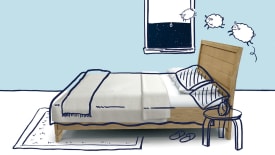How to Soothe Itchy Skin as You Age
Scratching may make things worse. Here's what to know about the creams that can offer lasting relief.

It’s annoying, uncomfortable, and tends to occur more commonly as we get older. “Dermatologists start to see an uptick in the presentation of itchy skin around age 50, and it continues to increase as people get older,” says Daniel C. Butler, MD, director of the aging skin and geriatric dermatology clinic at the University of California San Francisco.
Chronic skin conditions such as psoriasis or eczema, which typically require a doctor’s help, are the source of the problem in some cases. And allergies can cause itchy skin reactions, such as hives. But often there’s no clear reason for itchiness.
Scratching may simply make the situation worse. “Chronic itching causes chronic inflammation,” says Brian Kim, MD, director of the Mark Lebwohl Center for Neuroinflammation and Sensation at the Icahn School of Medicine at Mount Sinai in New York City. “Scratching is supposed to relieve itch but paradoxically, it triggers more inflammation and more itch.” Here are expert insights on how to prevent itchy discomfort and ease it.
What May Be Behind the Itch
Natural, age-related changes in your immune system may be the biggest culprit. These tend to promote systemic inflammation, “which tends to trigger more itching,” Kim says.
The nerves in your skin can also react in unusual ways. “They might tell your brain your skin is itchy even when there’s no stimuli that’s causing your skin to itch,” Butler says.
In addition, older skin may become far more sensitive. “Skin gets thinner and the skin barrier—whose job it is to help keep irritants out—becomes compromised,” says Mona Gohara, MD, an associate clinical professor of dermatology at Yale University. And in winter, dry indoor and outdoor air can certainly make skin more prone to irritation and itchiness.
Prevention Pointers
It’s key to treat your skin carefully. “Use a gentle, fragrance-free cleanser and warm—not hot—water,” Gohara says. “Also avoid scrubbing your skin or using exfoliating products.” Look for body washes that are soap-free; they’ll have milder, more moisturizing cleansing ingredients than other types of washes.
Treatments for Itch Relief
The first line of defense for mild itching and irritation is often an over-the-counter anti-inch cream. Kim recommends using these at night, when itching tends to be more bothersome. Look for a cream with hydrocortisone, a mild steroid that is typically used two times a day for two weeks.
If hydrocortisone doesn’t help, Butler suggests trying an anti-itch cream with pramoxine hydrochloride. Note: Unless your itchiness is allergy-related, oral antihistamines such as loratadine (Claritin and generic) or cetirizine (Zyrtec and generic) probably won’t help.
For chronically itchy skin that lasts for more than six weeks and interferes with sleep or other activities, it’s best to see your doctor or a dermatologist. They may be able to prescribe a stronger topical medication to stop the itching. “Don’t minimize it just because it’s a common thing,” Butler says.
Another reason to see a doctor: Chronic itching has been associated with several systemic conditions, such as kidney disease and anemia. “The skin is a window to the inside of the body,” Gohara says. “Any acute change is worth getting checked out, because it may mean something more than skin deep.”
Editor’s Note: This article also appeared in the January 2023 issue of Consumer Reports On Health.
















